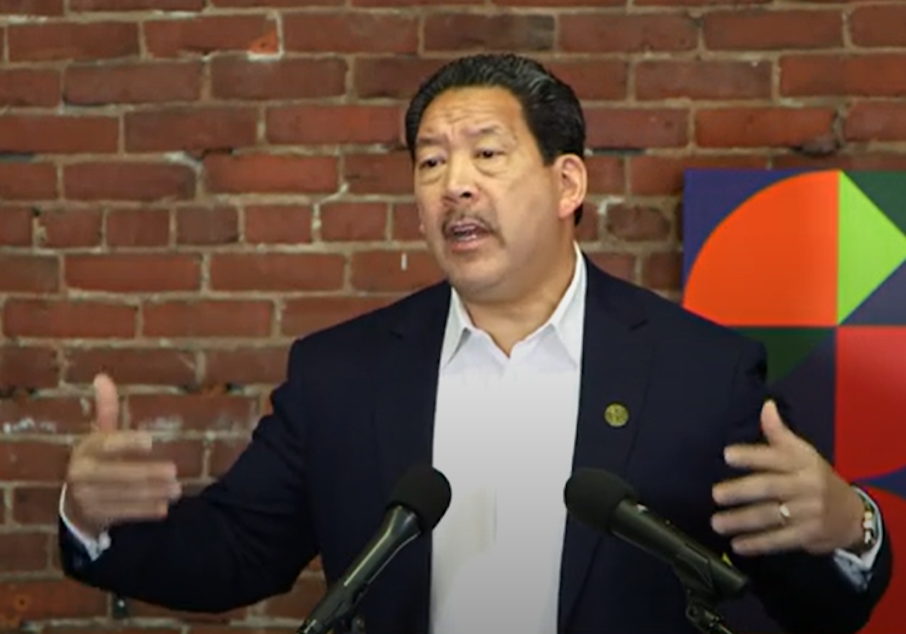Seattle 'poised' to get serious about public drug use, Mayor Harrell says

Seattle Mayor Bruce Harrell made the city's new drug law official Wednesday, when he signed the recently passed bill. The law will take effect on Oct. 20.
“We are poised to address the crisis with the seriousness that it is,” Harrell said, after he and City Attorney Ann Davison toured Evergreen Treatment Services in Seattle's SoDo neighborhood Wednesday.
Next, Mayor Harrell will issue an executive order sometime over the next few days, which will provide guidance for police on when to make arrests, and when to divert people to supportive programs. Seattle’s ordinance emphasizes that police should make arrests only if the person using drugs also poses a threat to others.
“Our officers are up for that,” he said. “So they’re not playing the role of caseworker that has been misdescribed by some accounts. What they’re simply doing is assessing threat as they are trained to do, and quite frankly that is their core competency.”
The tour at Evergreen was the first opportunity for Harrell and Davison to comment on the city's new law, which was controversial as it worked its way through the council process. They said that the tour wasn't timed to coincide with the passing of the ordinance. Instead, the visit was in honor of National Recovery Month. Evergreen offers medication-assisted treatment and wraparound services for adults with opioid use disorders.
The Seattle City Council approved the bill Tuesday with a 6-3 vote, aligning the city's drug law with the state's law, making drug possession and public use a gross misdemeanor.
Sponsored
Supporters expressed hopes that the new law will strengthen the city’s ability to respond to open-air drug markets and steer people to treatment and support before they overdose.
City Attorney Ann Davison says she is “relieved” that the law was passed.
“We really do need to be intervening with people in a meaningful way and making our public spaces safer, so I’m glad we can proceed on that,” she said, adding that her office will look at the cases that are referred by police to see if there are further opportunities to help people seek treatment and avoid prosecution.
“We will look at each case and make that determination based upon the facts of that case,” she said. “Knowing that we are an additional place for that exit way into treatment.”
Sponsored
Mayor Harrell noted that that the city will monitor "everything that we do" and keep track of the outcomes the city's approach is producing.
"We have a city council that certainly will help us look at the outcomes in one year – because that’s what we’re going to do," Harrell said. "We’re going to measure everything we do, every arrest we make, every person we divert towards treatment.”
Along with the new criminal penalty for public drug use, the city is expanding its drug overdose response through a new team based at the Seattle Fire Department, and the creation of an overdose recovery center so medics will have a place to take people once they have been revived.
Seattle City Councilmember Teresa Mosqueda was one of three council members who voted against adoption of the new drug law. She said in a statement that it offers only “a hollow promise of diversion” without a specific budget, and could disproportionately target people of color with criminalization and incarceration.
As staff members for the mayor and city attorney finished their tour at Evergreen Treatment Services, the organization’s vice president of policy and strategy Chloe Gale said their REACH street outreach teams will continue to contact people with substance use disorder and offer advice on how to best access care and services.
Sponsored
Gale said they don’t want the new law to have a chilling effect on people’s willingness to seek help for their friends in case of an overdose.
“We’ll continue to help people be aware of the Good Samaritan law and that their aiding and assisting their friends and their neighbors is not going to harm them in any way,” she said.
Gale said they’ll also be monitoring the outcomes that Harrell discussed.
“We’re going to look at the effect of the law and see if it changes patterns of behavior, and we’re going to see if that moves in the right directions to get more people into care.”


